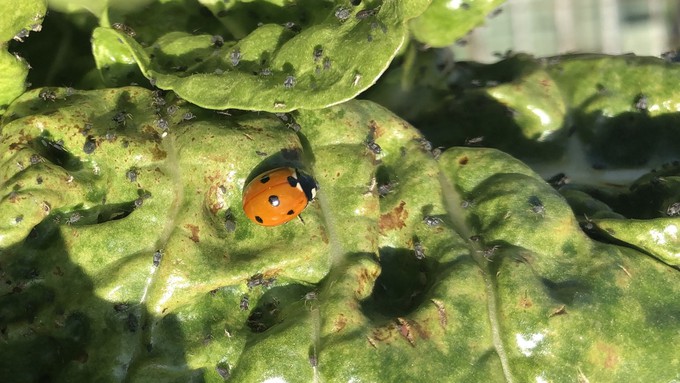
Free UC webinar on 'Natural Enemies & Beneficial Bugs'

An adult lady beetle considers the dining offerings on an aphid-infested chard plant. Immature lady beetles are even more voracious eaters of aphids than the adults are. Kathy Morrison
A free lunchtime webinar on "Natural Enemies & Beneficial Bugs" is this month's online offering from the University of California's Statewide Integrated Pest Management Urban/Community program.
The session will be conducted on Zoom from noon to 1 p.m. Thursday, July 20. It also will be recorded and made available on YouTube at a later date.
Eric Middleton, area IPM adviser for San Diego County, will lead the presentation, which will cover natural enemies in the insect world. He will discuss how these beneficial bugs -- which prey on or parasitize insect pests -- can help gardeners protect their gardens without pesticides.
Register here for the webinar.
Past sessions have covered topics such as pantry pests, aphids, squirrels, bed bugs and termites. For links to view them, see the full list here. To learn more about the webinar series, including upcoming topics, visit this website.
The main UC IPM website contains a wealth of information on pests of all kinds. Check it out at https://ipm.ucanr.edu/
Comments
0 comments have been posted.Sacramento Digs Gardening to your inbox.
Food in My Back Yard Series
April 1: Don't be fooled by these garden myths
March 25: Fertilizer tips: How to 'feed' your vegetables for healthy growth
March 18: Time to give vegetable seedlings some more space
March 11: Ways to win the fight against weeds
March 4: Potatoes from the garden
Feb. 25: Plant a fruit tree now -- for later
Feb. 18: How to squeeze more food into less space
Feb. 11: When to plant? Consider staggering your transplants
Feb. 4: Starting in seed starting
Sites We Like
Garden Checklist for week of March 30
Your garden doesn’t mind April showers. Get busy now to enjoy those future flowers.
* Get ready to swing into action in the vegetable garden. As nights warm up over 50 degrees, start setting out tomato, pepper and eggplant transplants.
* From seed, plant beans, beets, cantaloupes, carrots, corn, cucumbers, melons, pumpkins, radishes and squash. (Soak beet seeds overnight in water for better germination,)
* Plant onion sets.
* In the flower garden, plant seeds for asters, cosmos, celosia, marigolds, salvia, sunflowers and zinnias.
* Transplant petunias, zinnias, geraniums and other summer bloomers.
* Plant perennials and dahlia tubers for summer bloom.
* Transplant lettuce and cabbage seedlings.
* April is the last chance to plant citrus trees such as dwarf orange, lemon and kumquat. These trees also look good in landscaping and provide fresh fruit in winter.
* Smell orange blossoms? Feed citrus trees with a low dose of balanced fertilizer (such as 10-10-10) during bloom to help set fruit. Keep an eye out for ants.
* Apply slow-release fertilizer to the lawn.